Elizabeth Vos reports on a vast law enforcement training facility in Atlanta that defies the defund-police movement and sets the stage for Israel-linked militarized policing across the U.S.
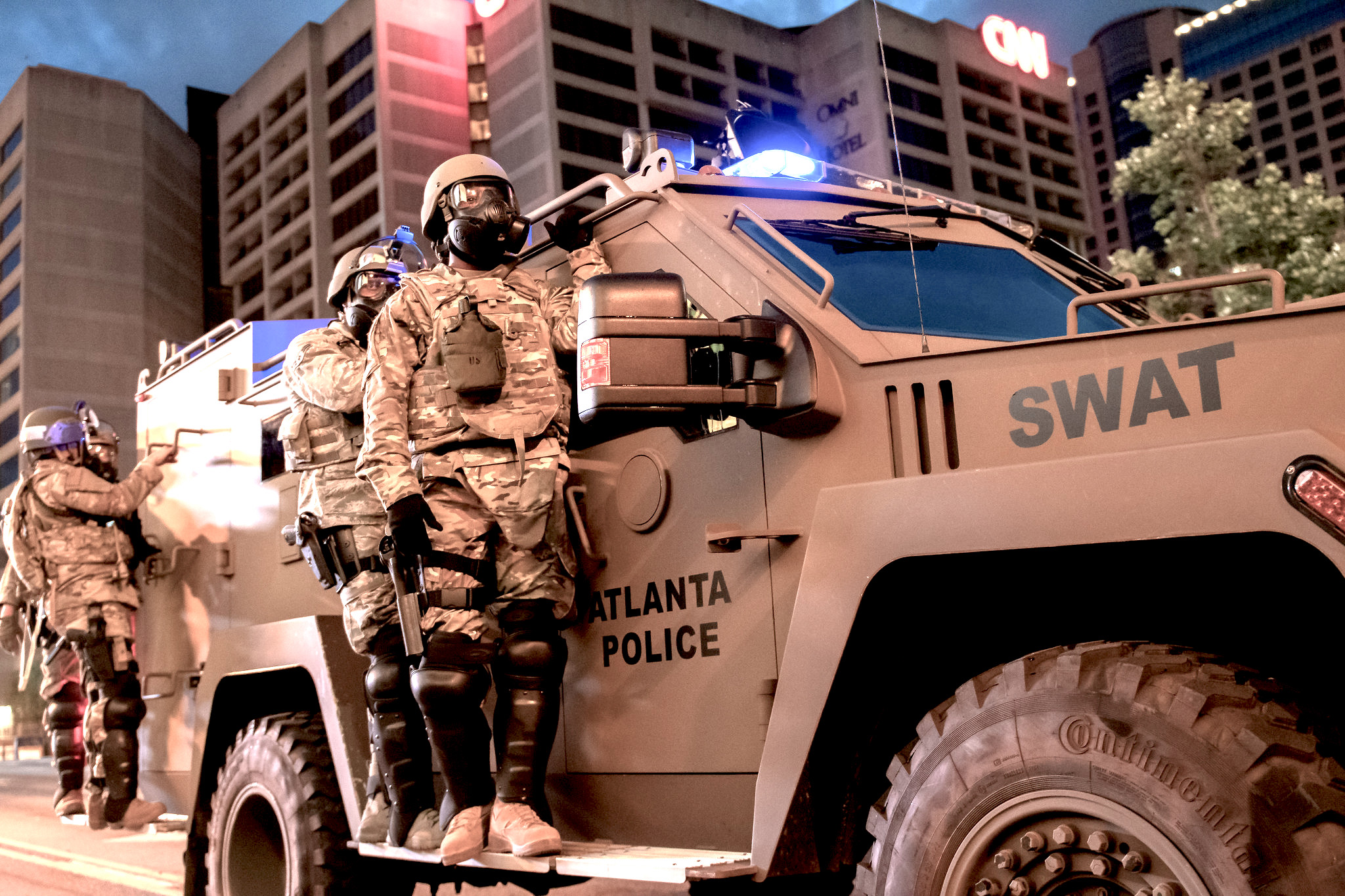
Georgia Air National Guard assist Atlanta Police Department SWAT team enforcing a curfew during demonstrations in Atlanta during Black Lives Matter protests, June 4, 2020. (U.S. Air National Guard, Roger Parsons, CC BY 2.0)
By Elizabeth Vos
Special to Consortium News
 After years of intense opposition that left one protester riddled by police bullets, Atlanta’s so-called Cop City is set to begin operations in the next few weeks. The city’s police chief hosted a tour of the campus last week and training programs are expected to start during the first quarter of 2025.
After years of intense opposition that left one protester riddled by police bullets, Atlanta’s so-called Cop City is set to begin operations in the next few weeks. The city’s police chief hosted a tour of the campus last week and training programs are expected to start during the first quarter of 2025.
The Atlanta Public Safety Training Center, as it is officially known, is an 85-acre campus with a price tag of at least $110 million and another $1.7 million recently approved by Atlanta’s City Council for its security.
Most infamously, it includes a mock city, for which the site gained its Cop City nickname, for “real-world” training that includes a convenience store, two-story house, apartment and commercial-style building.
There is also a military vet training center, leadership institute, lab to develop and test technological innovations, training field, 12-acre emergency vehicle operations course.
It also comes with burn towers, a shooting range, horse stalls, police-dog kennels and training grounds, and 40 acres of horse pasture, according to a video published by the Atlanta Police Foundation and the Foundation’s website.
Backlash to Black Lives Matter
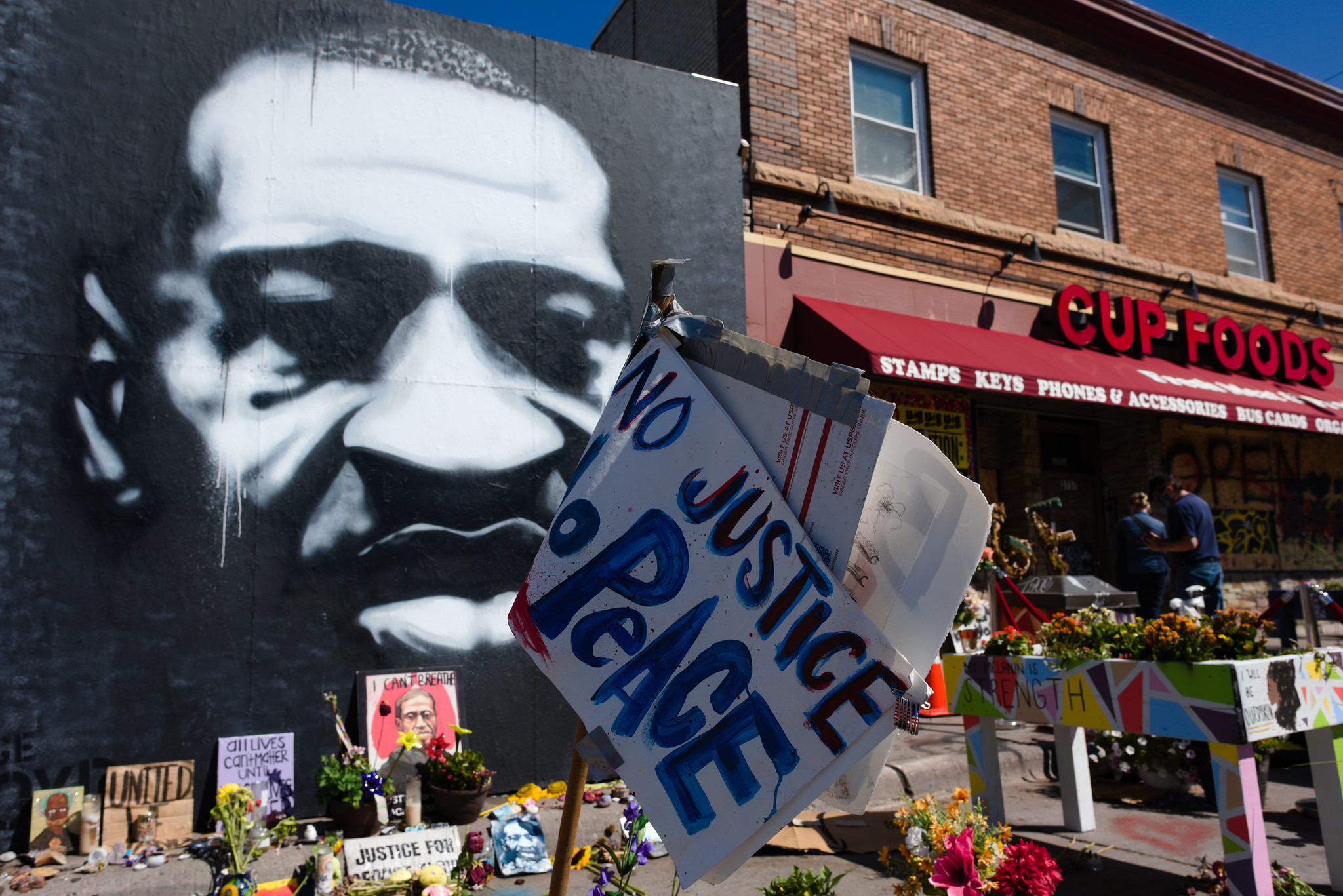
George Floyd memorial in Minneapolis, Aug. 17, 2020. (Fibonacci Blue, Flickr,CC BY 2.0)
Atlanta’s Cop City site was designated in 2021, the year after a white Minneapolis police officer named Derek Chauvin asphyxiated a Black man named George Floyd by kneeling on his neck for more than nine minutes.
Chauvin’s murder of Floyd, after a series of high-profile police killings of Black Americans, kicked the growing Black Lives Matter Movement into high gear, causing what has been described as one of the largest social movements in U.S. history, with some protests extending internationally.
The wave of demonstrations during the summer of 2020 shone a spotlight on the greater harm that police cause Black people, who are more than three times as likely to be killed by police, according to a study by Harvard University.
Protesters’ calls to defund and abolish the police yielded policing reforms efforts in several states.
At the federal level, however, the George Floyd Justice in Policing Act has stalled.
And while the wave of protests in 2020 helped expose the threat that police pose to the overall population in the U.S., they did not succeed in protecting Americans from deadly police violence. In 2024, police killed civilians at the highest rate in a decade, according to the collaborative research group Mapping Police Violence.
In Atlanta, Jasmine Burnett, a political organizer, told Prism that demands of defunding the police and investing in community programs “really scared city council members, scared the executives and the elites in the city, and that’s when they really put their foot on the gas to get this ‘Cop City’ project moving forward.”
More Police Funding
That pro-policing backlash to Black Lives Matter in Georgia appears to be occurring in many other parts of the U.S. In 2022, two years after the Black Lives Matter wave of demonstrations, police budgets were increasing year over year, according to a news analysis of the budgets for more than 100 law enforcement agencies across the country. Next year in Minneapolis, where George Floyd was killed, the city’s $230 million policing budget reportedly represents a 6 percent increase from this year.
Renee Johnston, co-host of Saturdays with Renee on Black Liberation Media, has been tracking steady interest and investment in police facilities across the country since 2020.
Please Support CN’s
Winter Fund Drive!![]()
Johnston argues that although many of the sites she tallied were planned or otherwise in progress well before 2020, the uprisings in the wake of Floyd’s death accelerated their approval or development.
U.S. President Joe Biden was bullish about the police during his abortive re-election campaign earlier this year, when he published a White House fact sheet touting the administration’s crime-crackdown.
“More than 1,000 communities across the country have invested over $15 billion to keep their communities safe and prevent crime,” the fact sheet boasts. “The President’s budget also funds his Safer American Plan, including providing for hiring 100,000 additional police officers for effective, accountable community policing.”
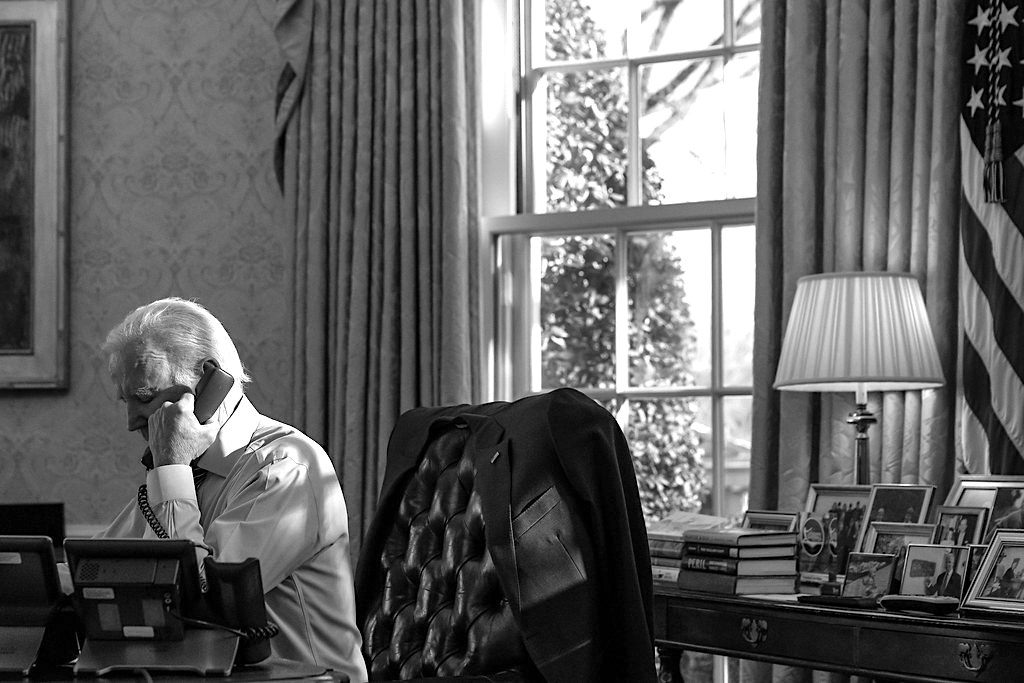
On Jan. 27, 2023, U.S. President Joe Biden calls RowVaughn and Rodney Wells, the mother and stepfather of Tyre Nichols, killed by police brutality that month in Memphis, Tennessee. (White House, Erin Scott)
Johnston says she produced her pdf spreadsheet to inform activists concerned about an intensifying police presence in their local communities. “Nationally, groups are organizing in multiple cities and states, there were some national meetings this summer and a national coalition has formed in hopes of creating shared processes and resources,” Johnston told Consortium News via email.
Her spreadsheet includes 83 projects of various sizes and in various stages — from proposal to completion — in every U.S. state except Wyoming at the time of writing.
Some of the projects are as seemingly innocuous as a 23,000-square-foot public safety center in Chisholm, Minnesota, that makes no mention of police training and includes a fire hall to replace one built during the days of horses and buggies as well as housing emergency services and the police department on one site.
But a few of the projects on Johnston’s radar are even bigger than Cop City Atlanta.
The most expensive is a $415 million project underway on state property near a maximum security prison in Nashville, Tennessee, which has broken ground on a 600 acre site and will reportedly house offices of the State’s Department of Correction and State Department of Safety and Homeland Security along with training facilities for state troopers and officers, including dorms, a driving track, and police-dog kennels.
Another behemoth is envisioned for Baltimore. At a projected cost of at least $330 million, it could include an Atlanta Cop-City-style “tactical village,” according to news reports.
The modernization and expansion of a Police Academy in Hershey, Pennsylvania, now under construction, is estimated at $300 million and will include a “tactical village” and other elements similar to Atlanta’s training facilities.
In New York City, a $225 million police training facility was announced this year.
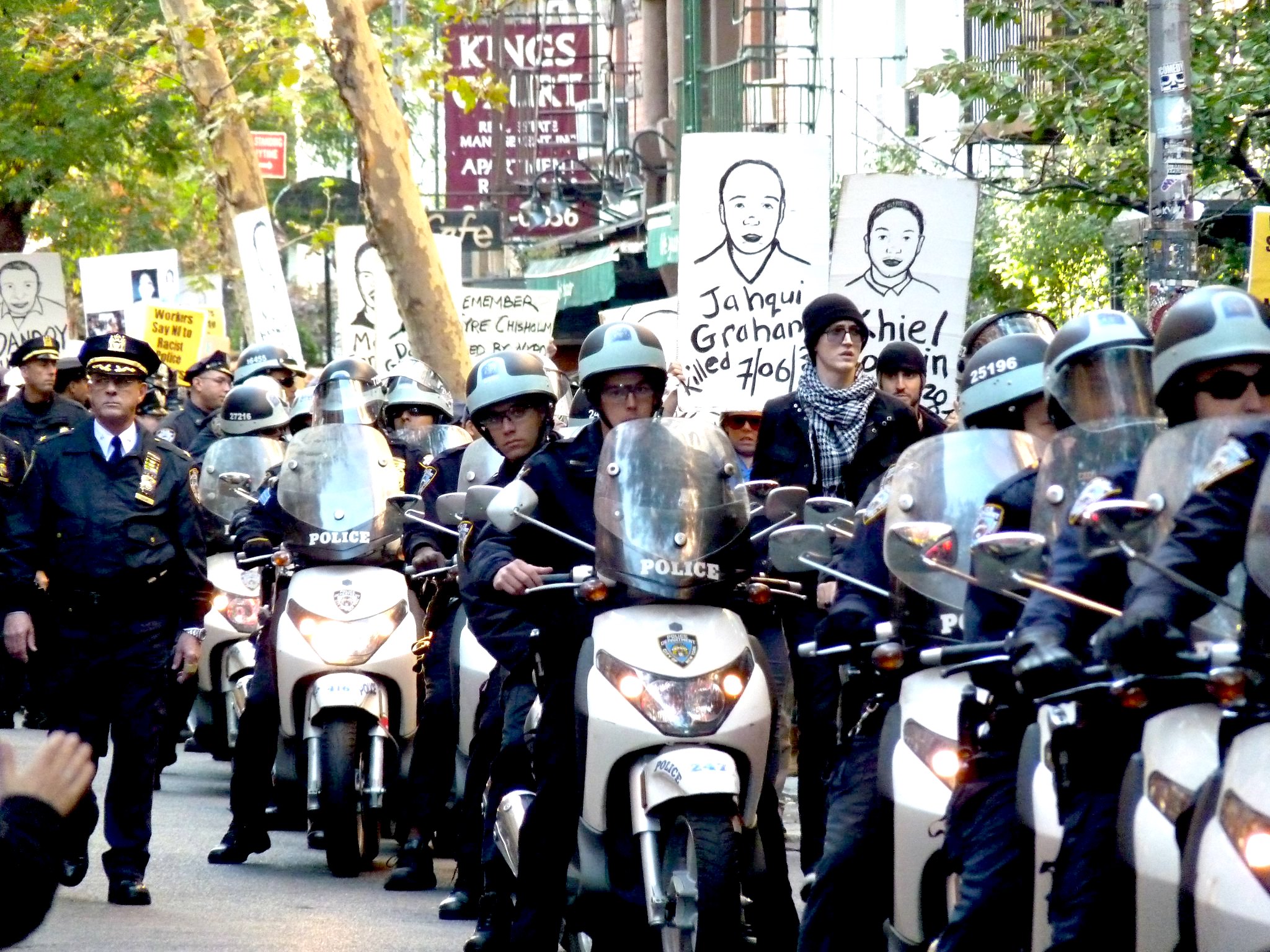
Motorcycle police alongside anti-police brutality march in New York City on Oct. 22, 2011, the 36th day of Occupy Wall Street. (Carwil Bjork-James, Flickr, CC BY-NC 2.0)
Protest History
Coming a year after the peak of the Black Lives Matter movement, the announcement of the Atlanta training center in 2021 sparked immediate protests, which became the “Stop Cop City” and “Defend The Atlanta Forest” movements.
Activists referring to themselves as forest defenders began occupying the South River Forest, part of the land designated to become Cop City in late 2021, with some living in tree houses full-time for months.
The occupation of the forest was meant to resist both the authoritarian implications of such a massive police training campus and the environmental damage the facility reportedly poses to an area that has been called one of the “lungs” of Atlanta.
The site’s firing range alone could be a potent source of heavy metal contamination. The looming spectre of environmental damage led to lawsuits by local environmental organizations.
The overall protest movement against the campus has been decentralized and leaderless, with some hopeful that the land might one day be returned to the Muscogee people.
The occupation of the forest saw an aggressive response from Georgia authorities that escalated over time and included heavy police surveillance verging on harassment. Eight protesters were arrested in May 2022 as police forces attempted to clear activists from the area. On Dec. 13 that year, five protesters were arrested and charged with domestic terrorism. They would not be the last.
On Jan. 18, 2023, an early morning police action against the forest defenders brought the killing of Manuel Paez Terán, who went by “Torguguita,” and was shot 57 times. The 26-year-old was sitting down cross-legged with hands raised when shot, according to an autopsy.
The family of Terán recently filed a federal lawsuit against three of the officers involved in the killing, claiming that they breached Terán’s Fourth and First Amendment rights.

A shrine in Atlanta on Jan. 19, 2023, the day after the police killing of Manuel Esteban Paez Terán, aka Tortuguita. (Tatsoi, Wikimedia Commons, CC BY-SA 4.0)
RICO Charges
State prosecutors have pursued a novel legal strategy that has been criticized for criminalizing political protest. In August 2023 they indicted 61 Cop City protesters for allegedly violating Georgia’s Racketeer Influenced and Corrupt Organizations Act, in what has been described as the largest use of so-called RICO statutes against a protest movement in U.S. history.
RICO laws were designed for prosecuting organized crime. As an example of how incongruously those laws apply to activists, prosecutors hit people organizing a “solidarity fund” for some protesters with money laundering charges.
[See: Georgia Frames Cop-City Protest as Criminal Conspiracy]
With documented encouragement from the federal Department of Homeland Security, prosecutors in a state that had broadened its definition of domestic terrorism in 2017, brought separate domestic terrorism charges against dozens of the same defendants for allegedly using fireworks and molotov cocktails against police, though no one was reported injured.
At one point in March 2023, police went so far as to arrest a legal observer for the Southern Poverty Law Center and the National Lawyers Guild.
All of the money laundering charges were later dropped, with prosecutors criticized for “blatantly violating” protester’s rights. The rest of the charges remain, however, with some trials in progress and others set to start next year.
Who Is Behind Cop City?
The Atlanta Police Foundation (APF), a nonprofit organization formed in 2003 is the principal funder of the Cop City project. As an NGO, it is not accountable to public oversight.
The APF is instead legally accountable to a board of directors who include powerful corporate players — CEOs of Waffle House and the Atlanta Hawks, VPs from the Home Depot and Delta Air Lines — and members of Atlanta’s ruling class, as a 2022 report by The New Yorker details. Cox Enterprises, a media conglomerate based in Atlanta that owns the city’s largest newspaper, The Journal-Constitution, which has run editorials in favor of the project, is among Cop City’s corporate donors. Cox’s CEO, Alex Taylor, is the chair of fund-raising for the training facility, according to the same New Yorker article.
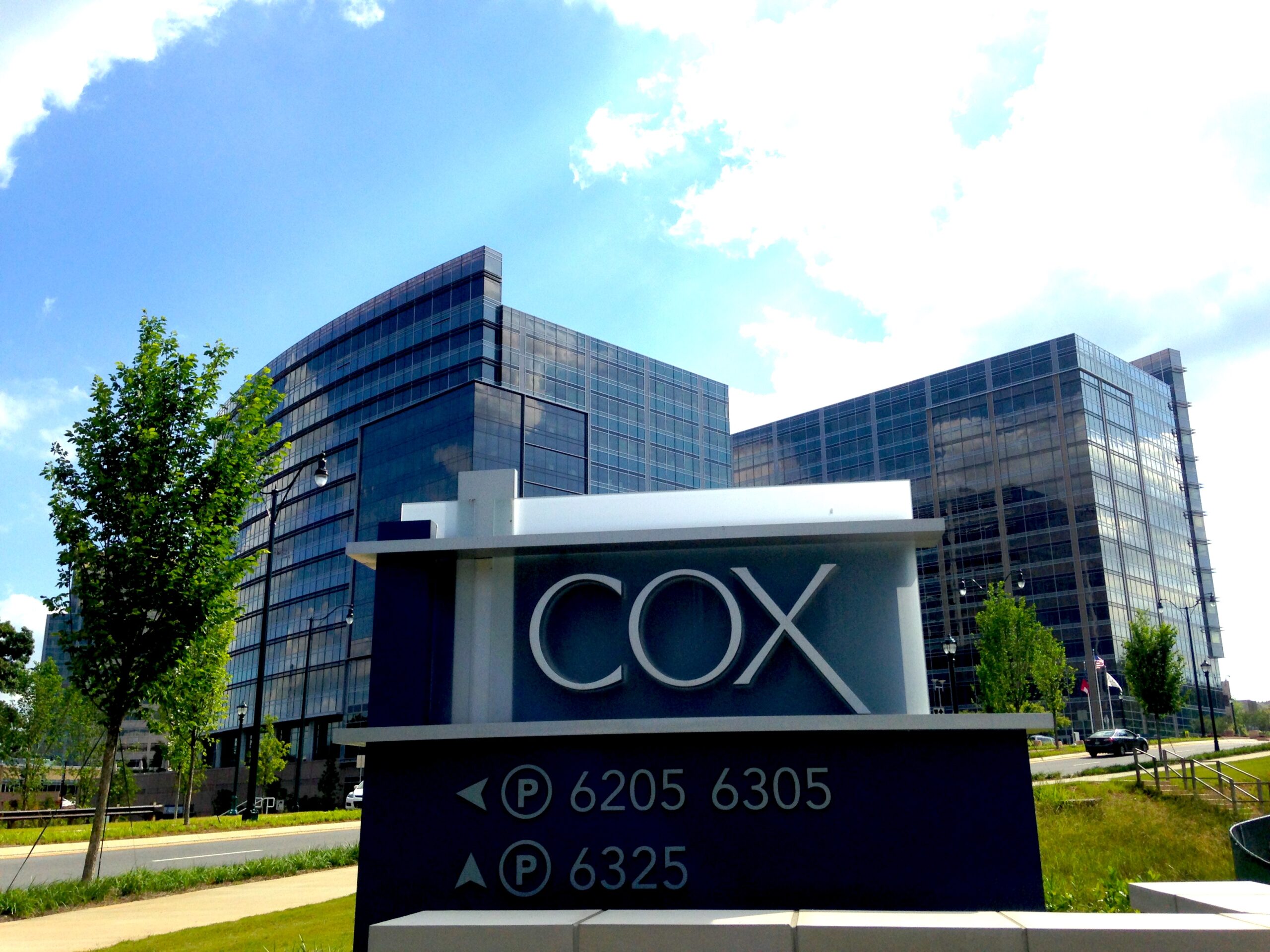
Cox Enterprises headquarters in Atlanta. (Taylor2646, Wikimedia Commons, CC BY 4.0)
Links With Israel
The Atlanta Police Foundation is also a central point of connection between Cop City and pro-Israel interests. As Derek Seidman reported for Truthout in July, the project is expected to “deepen a policing ecosphere in Atlanta with close ties to Israeli forces that oppress Palestinians.”
That Israeli-linked “ecosphere” has a lot to do with the Georgia International Law Enforcement Exchange (GILEE) program. Based at Georgia State University, GILEE has long facilitated trips for law enforcement to Israel and other countries. As 11Alive reports:
“for more than three decades, law enforcement leaders from around the metro have traveled to Israel to train officers there on best practices in community policing and homeland security.”
Similar programs outside Georgia facilitate training in Israel or with Israeli personnel, including exchanges run by the Anti-Defamation League (ADL) and the Jewish Institute for National Security of America (JINSA).
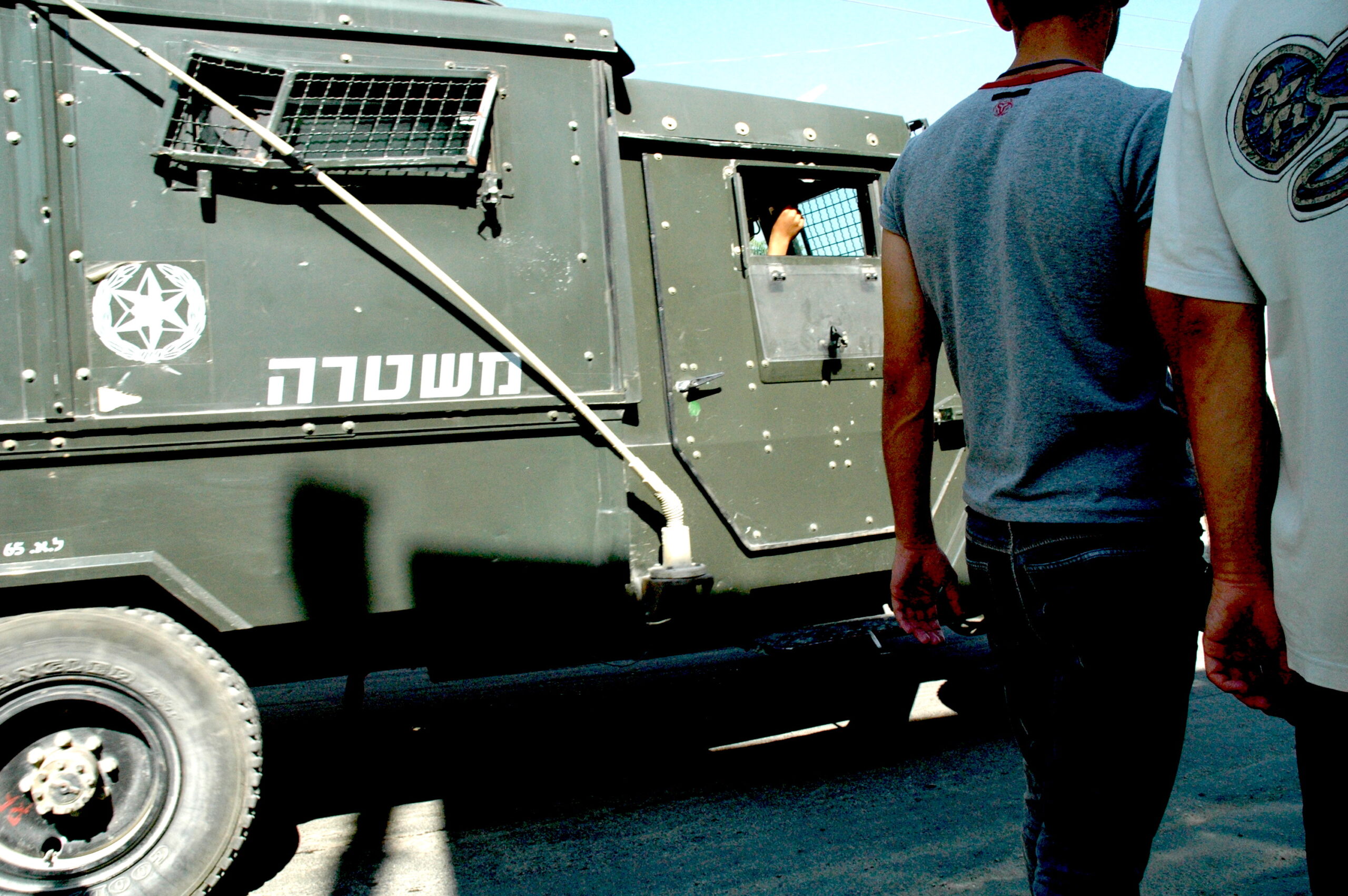
An Israeli Border Police armored car, August 2004. (Justin McIntosh, Wikimedia Commons, CC BY 2.0)
These programs were largely created after 9/11 for U.S. law enforcement to receive counter-terrorism training from Israeli authorities thanks to the latter’s experience in brutally suppressing Palestinians. Organizations such as Jewish Voices for Peace and others contend that such exchanges have helped militarize U.S. police forces.
When training with Israel, U.S. police delegates witness “live demonstrations of repressive violence in real-time, in protests across the West Bank, patrols in East Jerusalem, and visits to the Gaza border,” Eran Efrati, executive director of Researching the American-Israeli Alliance (RAIA), told Al Jazeera in 2020.
In 2020, hacktivists further documented strong ties between U.S. law enforcement and Israel, as well as policing links with U.S.-based organizations like the ADL.
Those who support the police training center in Atlanta argue that it will include de-escalation techniques.
“In addition to the focus on tactical training, the PSTC will emphasize cultural awareness, community knowledge, and the variety of citizen concerns that modern policing in a diverse city requires of an effective and trusted law enforcement agency,” says The Atlanta Police Foundation’s website.
But given the size and scope of the Atlanta facility, along with its connection to Israeli training methods, such reassurances are not likely to assuage alarm at the prospect of a corporate-backed, militarized police force with tentacles beyond Georgia. Over 40 percent of the trainees at the Atlanta facility would come from outside the state, according to documents obtained by the Atlanta Community Press Collective.
The center’s mock city is reminiscent of urban warfare training performed by the military. The site’s design, the extreme prosecutions and apparently coercive surveillance of protesters speaks to the treatment of the public as a potentially terroristic enemy.
Elizabeth Vos is a freelance reporter, co-host of CN Live! and regular contributor to Consortium News.
Views expressed in this article may or may not reflect those of Consortium News.
Please Support CN’s
Winter Fund Drive!![]()
Make a tax-deductible donation securely by credit card or check by clicking the red button:


The Constitution authorizes the States, individually or collectively, if they are ‘actually invaded’ or are ‘in such imminent danger’, to declare a War which would activate the states’ National Guard, establish martial law and suspend Due Process. Ref. Art. 1, Sec, 10, cl 3.
The US military is prohibited by law from operating inside the US. The establishment is getting around that by turning the police into an army.
“Mock City” specific:
At least Someone is trying to solve USA Housing shortage!
“emphasize cultural awareness, community knowledge”
Nice words, but of course meaningless in modern corporate PR talk. To illustrate this point, I’ll observe that both terms are entirely consistent with Israel’s operations and actions in Gaza. One thing that is known is that Israel has been using an AI powered system to identify targets and quickly order strikes. “Cultural awareness” and “community knowledge” are words that are vague enough to include the inputs into such a system. A more crude way of putting it would be that bombing a mosque requires “cultural awareness”. Otherwise that mosque is just another building.
Yes, a person or group who is collecting cultural awareness and community knowledge about you and the people around you can be using that to cause you harm. And as the world moves from Collateral Damage to Genocide, one could say that these factors become more important to the operations. Collateral Damage was more random, while Genocide is an attempt to destroy a culture and ‘a people’ which in turn requires more cultural awareness and community knowledge.
I fled Atlanta 20 years ago, but back then the Atlanta Police Dept had an extensive record of corruption. All of the below is “If I remember correctly”
— An entire district of the city, a substantial part of the city, was investigated in a conspiracy where almost every cop in the district was ‘dirty’. Yes, I had the pleasure of living in that part of town.
– A robbery gang was busted that had been hitting the big box stores. It was all veteran APD officers. They would ‘case the joint’ in uniform as a part of their duties, then come back at night and enter by cutting a hole in the metal roof, repelling down (probably a skill to be trained at “Cop City”) and then backing up a truck to load up.
— An alternative newspaper revealed that a Police commander who was running for mayor had an ‘interesting’ run in with the FBI. He was leading the city’s “anti-drug/anti-gang’ “Red Dog Squad” (maybe “Red Dawg Squad” in GA spelling?). The FBI was concluding an investigation into organized crime, and was going to wrap it up by throwing a party for their targets to gather them all together. Then, to their surprise, this police commander entered the room, started glad-handing all his friends, and complaining about how they could be throwing such a party without inviting him. The FBI had to find a way to get him out of the room before they arrested all his ‘friends’. Thankfully, he didn’t get elected as mayor. But the person who won I still think ended up in one of the then traditional FBI investigations of the Atlanta Mayor and City Council.
All of the above is “if I remember correctly”, as I followed Rogers Waters advice that “I’d better run” 20 years ago.
I fled Atlanta 20 years ago, but at that time, the Cox family had a lot more media power than just the town’s monopoly newspaper. They also owned the city’s number one TV station (WSB) and the regional high-powered AM station that could be heard across a wide part of the country, (also WSB). The local cable system was ‘Cox Cable’.
Thus, the Cox family controlled the city’s monopoly newspaper, the number one rated local TV news, the number one rated radio news (on the station that broadcast Rush Limbaugh in the metro area), and control of the channels on the local cable system.
What “De-fund the Police Movement?”
In the last election, both major candidates were strongly pro-police and promising to ‘get tough on crime’. Donald Trump promises crackdowns to the point of constitutional violations. The Democrats ended up replacing pro-Police Joe Biden with former District Attorney and Attorney General Harris who vowed a ‘strong DOJ’ and who has always stayed far, far away from any calls to defund her friends and colleagues in the police. Over 95% of Americans voted for these more-fund-the-police candidates.
Democrats in city elections take the same ‘get tough on crime’ line. Even the ones who claim to be ‘progressive’. They are all pro-police.
The only movement aiming to defund police in recent times has come from the House Republicans. They’ve worked for the last two years to defund the police at the IRS who try to catch tax-cheats.
The powers-that-be seem to be intent on turning our cities into class war zones.
The wealth hoarding class is circling the wagons as its criminal enterprise becomes more and more threatening to people’s ability to survive. Cop Cities are just one more attempt to prevent accountability by criminalizing dissent.
I emigrated from the US some years back and…as I was leaving I said “the US is turning into a police state”.Looking back now…the understatement of the year…
Those are not police — they are cosplay Star Wars©? characters dressed up for boy-dates.
Police — on the other hand — SERVE & PROTECT.
Fear abounds at the top — potus, et alia — and spreads like an illness…
Police — on the other hand — SERVE & PROTECT.
Yes – but first and foremost property rights. Not ordinary people, that are to serve them as well. And when things have gone so far as they are, all that’s left ist mopping up. That’s what we see here.